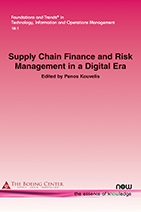Empowering Economic Growth: Government Loans for Supply Chains in Emerging Markets
By Jing Hou, Nanjing University, China, jinghou@smail.nju.edu.cn | Fasheng Xu, University of Connecticut, USA, fasheng.xu@uconn.ed
Abstract
MSMEs (Micro, Small and Medium Enterprises) play a crucial role in emerging markets, despite facing various challenges that impede their growth and success. One primary challenge is the limited access to affordable financing programs. A typical policy intervention is providing affordable government loans to these MSMEs. Motivated by the Indian example, we develop a game-theoretic model to investigate the interaction between the cash-constrained manufacturer and retailer in the context of interest-free government loans. Our research yields the following main insights. First, the value of trade credit can demonstrate both complementary and substitutional relationships with the government loan budget, contingent on the level of the government loan budget. Second, while the government loan consistently enhances the manufacturer’s profit, it may adversely impact the retailer. Finally, in the design of a loan policy, it may be more beneficial for social welfare if the government retains some of the loan budget rather than lending the entire available amount to the supply chain.
Supply Chain Finance and Risk Management in a Digital Era
This special issue, which surveys the most recent research in integrated risk management for supply chains, is motivated by the success of the 8th “Supply Chain Finance and Risk Management Workshop,” which was held at the Olin Business School of Washington University in St. Louis on May 30 and May 31, 2023. The Editors wanted timelier access to the latest research on supply chain finance and supply chain risk management. It is well-known, that due to review process lead times, articles published in traditional journals can take 2 to 3 years. The idea of producing an edited volume, which would include the latest articles on the topics above appealed not only to the workshop participants but also to other active members of the iFORM (Interface of Finance, Operations, and Risk Management) research community. Foundations and Trends in Technology, Information and Operations Management provides an ideal outlet for such a volume.

Companion
Foundations and Trends® in Technology, Information and Operations Management, Volume 18, Issue 1 Special Issue: Supply Chain Finance and Risk Management in a Digital Era
See the other articles that are also part of this special issue.